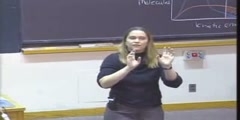Lec 20 - Philip Roth, The Human Stain (cont.)
The American Novel Since 1945 (ENGL 291) In this lecture Professor Hungerford discusses how the novels we read are shaped by legal and market constraints. She traces a history of censorship from the Comstock laws, to the policing of Joyce's Ulysses and Ginsberg's Howl, and shows how changes in publishing practices have tended to penalize more unusual, less profitable books. Hungerford also touches on the canon debates of the 80s and 90s (citing John Guillory and Toni Morrison), and the issues of intellectual property and internationalization raised by digital literature. Finally, she points to some ways that Philip Roth, despite his controversial representations of Judaism and of women, succeeds in tackling fundamental human concerns. 00:00 - Chapter 1. Observing Local Bookshops: Patterns of Display and Absence 12:28 - Chapter 2. The History of Legal Censorship in the United States 23:43 - Chapter 3. New Forms of Censorship: The Influence of the Market 31:41 - Chapter 4. The Other Side of the Coin: Intellectual Property and Infinite Access in the Digital Age 35:15 - Chapter 5. Problems in Deriving the Modern Literary Canon: A Proliferation of Points of View Complete course materials are available at the Open Yale Courses website: http://open.yale.edu/courses This course was recorded in Spring 2008.
Video is embedded from external source so embedding is not available.
Video is embedded from external source so download is not available.
Here is the next lecture for this course
Lec 21 - Philip Roth, The Human Stain (cont.)
45:59 | 3228 viewsLec 19 - Philip Roth, The Human Stain
48:52 | 2671 viewsLec 3 - SIMS 141 - Intellectual Property ...
48:58 | 2825 viewslEC 70 - Roth IRAs
16:49 | 2179 viewsLec 168 - Human Capital
05:57 | 1799 viewsLec 6 - The New Science of Human Capital
09:13 | 2846 viewsChemical Science - Kinetics (cont.) - Lec ...
43:22 | 10454 viewsLec 4 - Newton's Laws (cont.) and Incline ...
01:07:25 | 3697 viewsLec 10 - A New Vision for Capital Markets
54:57 | 3006 viewsLec 1 - Iterating Your Product and Market ...
51:50 | 3454 viewsLec 5 - The Rise of the Polis (cont.)
01:06:43 | 2492 viewsLec 24 - Twilight of the Polis (cont.) an ...
01:16:16 | 2630 viewsLec 19 - History of the Mortgage Market: ...
01:19:18 | 2918 viewsLec 11 - Marx's Theory of Historical Mate ...
48:53 | 2789 viewsLec 7 - Don Quixote, Part I: Chapters XXI ...
01:00:51 | 3176 viewsNo content is added to this lecture.
This video is a part of a lecture series from of Yale
Lecture list for this course
Lec 2 - Richard Wright, Black Boy
Lec 3 - Flannery O'Connor, Wise Blood
Lec 4 - Flannery O'Connor, Wise Blood (cont.)
Lec 5 - Vladimir Nabokov, Lolita
Lec 6 - Guest Lecture by Andrew Goldstone
Lec 7 - Vladimir Nabokov, Lolita (cont.)
Lec 8 - Jack Kerouac, On the Road
Lec 9 - Jack Kerouac, On the Road (cont.)
Lec 10 - J. D. Salinger, Franny and Zooey
Lec 11 - John Barth, Lost in the Funhouse
Lec 12 - Thomas Pynchon, The Crying of Lot 49
Lec 13 - Toni Morrison, The Bluest Eye
Lec 14 - Maxine Hong Kingston, The Woman Warrior
Lec 15 - Marilynne Robinson, Housekeeping
Lec 16 - Marilynne Robinson, Housekeeping (cont.)
Lec 17 - Cormac McCarthy, Blood Meridian
Lec 18 - Cormac McCarthy, Blood Meridian (cont.)
Lec 19 - Philip Roth, The Human Stain
Lec 21 - Philip Roth, The Human Stain (cont.)
Lec 22 - Edward P. Jones, The Known World
Lec 23 - Edward P. Jones, The Known World (cont.)
Lec 24 - Students' Choice Novel: Jonathan Safran Foer, Everything is Illuminated
Lec 25 - Students' Choice Novel: Jonathan Safran Foer, Everything is Illuminated (cont.)















